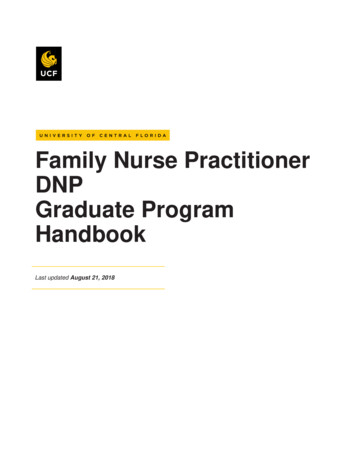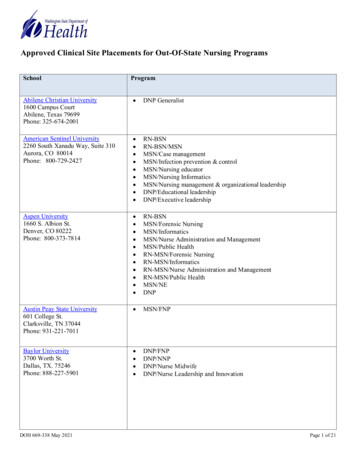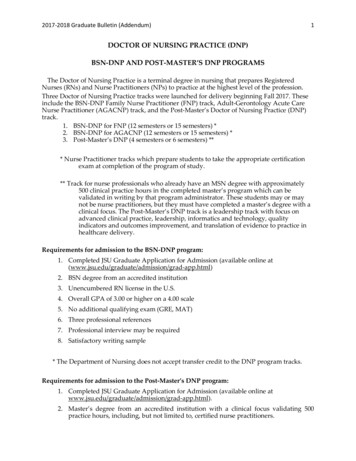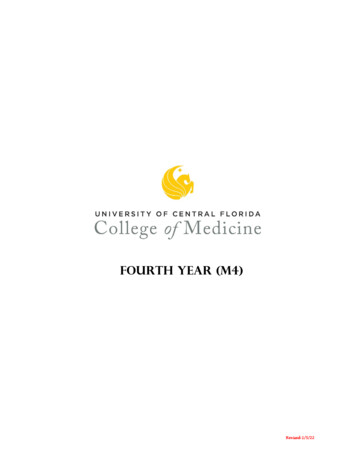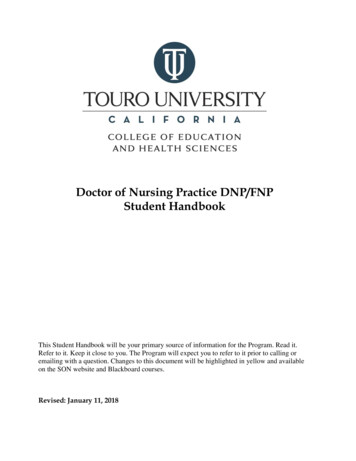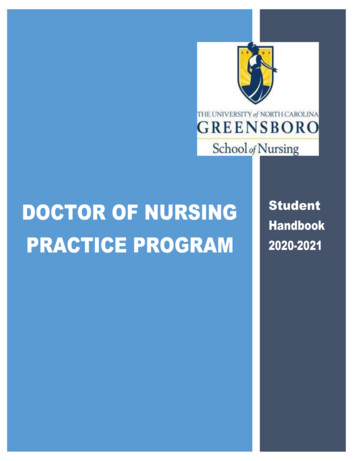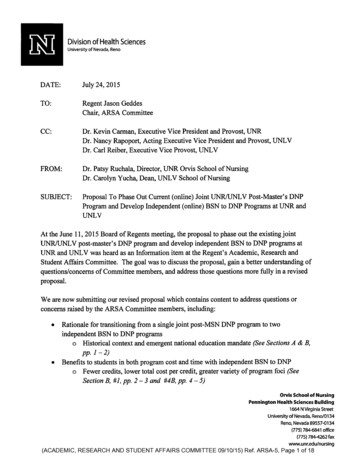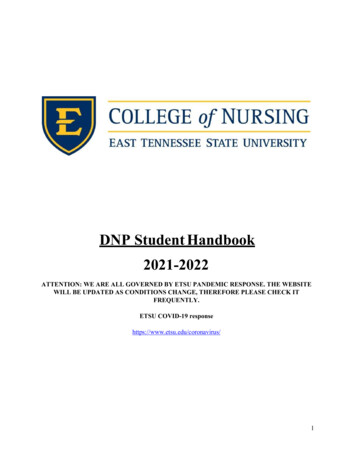
Transcription
DNP Student Handbook2021-2022ATTENTION: WE ARE ALL GOVERNED BY ETSU PANDEMIC RESPONSE. THE WEBSITEWILL BE UPDATED AS CONDITIONS CHANGE, THEREFORE PLEASE CHECK ITFREQUENTLY.ETSU COVID-19 responsehttps://www.etsu.edu/coronavirus/1
Welcome to the East Tennessee State University College of Nursing and Congratulations on youracceptance to the College of Nursing and the beginning of your exciting journey to an advanced degree inNursing. What a time to start your classes, we are still in the throes of a world-wide pandemic and theneed for professional nurses is greatly increased. It is our hope that you have arrived expecting to studyhard, efficiently manage your time, attend all classes and complete assignments in order to increase yourknowledge to meet the challenge of becoming an advanced degree nurse.The mission of the College of Nursing is to facilitate the health of the community through excellence andinnovation in nursing education, research, scholarship, creative activity, service, and practice. As astudent, you will be involved in fulfilling this mission through your guided clinical experiences and theunderstanding and knowledge gained from not only this clinical experience but the simulation experiencesas well as the lecture and structured learning in classroom or online experiences. Please learn all that isoffered, as a patient’s life or student’s experience in learning may depend upon it.In order for you to understand the policies and procedures in the College of Nursing, this Graduate StudentHandbook has been prepared for you. The handbook will answer many of your questions that you haveabout the resources available to you and the opportunities available to you as a student.Please feel free to contact any college administrator, faculty, or staff member should you need assistance orsupport. We are here for you. Do not hesitate to seek our assistance.Again, congratulations and welcome to the Graduate Department, College of Nursing!Most Sincerely,KathrynKathryn W. Wilhoit, RN, MSN, PhD, NEA-BC. FACHEInterim DeanEast Tennessee State University, College of Nursing423-439-70512
PREFACEThe purpose of this student handbook is to assist you in understanding the policies, procedures, and generalinformation specific to the DNP program within the College of Nursing at East Tennessee State University. Theinformation in this guide should supplement, not substitute, information published in the East Tennessee StateUniversity graduate catalog.Successful matriculation and graduation from an academic program requires adherence to all policies, procedures,and regulations as stipulated by both the College of Nursing and the university. If you have any questions regardingrequirements or policies, do not hesitate to refer them to your academic advisor, program director, or otherappropriate persons.This handbook presents the policies, procedures, and general information in effect at the time of publication.Students affected by any changes to this handbook will be notified in writing. The current handbook will also beavailable online at http://www.etsu.edu/nursing in the College of Nursing Graduate Programs section.This handbook is not intended to state contractual terms and does not constitute a contract between thestudent and the College of Nursing.East Tennessee State University is an AA/EEO employer and does not discriminate on the basis of race, color,national origin, veteran status, sex, disability, or age in its programs and activities. The following person has beendesignated to handle inquiries regarding the non-discrimination policies: Interim Equal Employment ComplianceOfficer and Title IX Coordinator and may be contacted at: 206 Burgin E. Dossett Hall, Johnson City, TN 37614,423-439-4445. Additionally, the Title IX Coordinator is designated to monitor and oversee Title IX complaints.https://www.etsu.edu/ehome/aa eeo.phpDNP students please note:This DNP Handbook is not a contract and is subject to change.The Handbook in accordance with the Graduate Catalog in place at the time ofmatriculation is the document that governs each individual student’s matriculation inthe program.3
TABLE OF CONTENTSPageSection I - History, Vision, Mission, Values, Goals, Philosophy, and Program OutcomesCollege of Nursing Vision, Mission, Goals, and Values . 6DNP Purpose, Goals, Values, and Competencies . 7DNP Program Competencies . 7DNP Curriculum Requirements and Program PlansMSN to DNP Program of Study, Full-time and Part-Time . 10BSN to DNP Programs of Study-ConcentrationsFamily Nurse Practitioner-Full Time . 18Family Nurse Practitioner-Part Time . 19Psychiatric/Mental Health Nurse Practitioner –Full Time . 21Psychiatric/Mental Health Nurse Practitioner-Part Time . 23Adult-Gerontology Primary Care Nurse Practitioner-Full Time . 24Adult-Gerontology Primary Care Nurse Practitioner-Part Time . 26Executive Leadership-Full Time. 28Executive Leadership-Part Time. 30Concentration Courses .32Interprofessional Education and Practicum Policy . 33Section II - Progression, Readmission, and Graduation PoliciesProgression, Readmission, Transfer, Leave of Absence, Readmission, Advisement . 33Intensives . 36DNP Project .37Graduation Policies and Procedures . 36College of Nursing Grade Scale . 37Graduate Student Policies, Catalog, DNP Handbooks and DNP Project Guideline Links .37Section III- Regulations on Student ConductAcademic Misconduct . 38Clinical Placement and Preceptors. 38Code of Ethics (Faculty/Student) . 39General Professional Behavior. 39Honor Code. 41Honor Pledge . 41Identification Badges/Lanyards/Insignias. 42Information Technology Student Conduct. 42Name and Credential Signature . 44Professional Dress Guidelines . 44Social Media/Networking/HIPAA . 45Substance Abuse Policy (Rules and Regulations Related to Unprofessional Conduct) . 474
Section IV - Other Guidelines, Policies, and ProceduresAddress/Name Change . 49Advisement and Registration/Drop, Add, Withdraw . 49Cancellation of Day, Evening, and Weekend Classes Due to Inclement Weather . 50College of Nursing Graduate Division Inclement Weather Policy. 50Class and Clinical Attendance Policy . 50Employment of Students . 51Hazardous Chemical Right-to-Know Law. 51Hospitalization Insurance for Students . 51Literary Format . 51Resolving Academic Concerns . 51Section V - College and University Resources and ServicesClass Officers and Representatives. 53Counseling Center. 53Disability Services . 53Faculty Practice Network, College of Nursing . 54Financial Aid and Scholarships . 54Graduate & Professional Student Association . 54Learning Resource Center (Computer Lab). 55Libraries . 55College of Graduate and Continuing Studies . 55Security Information Report . 55Sigma Theta Tau, International Honor Society of Nursing . 55Skills Practice Lab . 56Student Health Services Clinic . 56Testing Center (College of Nursing). 56Center for Academic Achievement (University)/Writing and Communication Center/Tutoring . 56Appendix- Mandatory Clinical Requirements for All Graduate NursingStudents .575
EAST TENESSEE STATE UNIVERSITYCOLLEGE OF NURSINGVISIONTo be the best College of Nursing in the state and region, nationally recognized in improving health through theinnovation and integration of teaching, research, service, scholarship, and practice.COLLEGE OF NURSING MISSION ANDVALUESThe mission of the College of Nursing (CON) is to facilitate the health of the community through excellence andinnovation in nursing education, research, scholarship, creative activity, service, and practice.We Value: Professional interactions that demonstrate caring, respect,and compassion for others. Diversity and inclusivity, embracing the full scope ofhuman cultures, ethnicities, and identities. Excellence in fulfilling the intellectual work of the collegethrough collaboration and cooperation. The nursing profession’s global contributions to socialjustice and to the holistic health of individuals, families,and communities. Stewardship and accountability in the use of resources. Innovative leadership modeled through effective sharedgovernance principles.The mission of the College of Nursing is to facilitate the health of the community through excellence and innovation innursing education, research, service, scholarship, and practice.GOALS1.2.3.4.5.6.7.Provide highest quality nursing education programs.Provide BSN, MSN, DNP, and PhD graduates to address nursing workforce needs.Provide culturally diverse and international opportunities for students and faculty.Engage in faculty, staff, and/or student research and scholarly activities that improve health andadvance nursing knowledge.Deliver innovative health care in partnership with communities.Influence systems and policies, through professional leadership and collaboration, to improveindividual and community health.Engage in interprofessional education, research, service, scholarship, and health care delivery.ETSU VALUESEast Tennessee State University pursues its mission through a student-centered community of learning reflecting highstandards and promoting a balance of liberal arts and professional preparation, continuous improvement, and based uponcore values. The College of Nursing faculty and staff will support and exhibit the university’s core values as follows:PEOPLE come first, are treated with dignity and respect, and are encouraged to achieve their full potential;July 15, 2018; Updated 1/02/2019; Updated 6/13/2019; Updated 8/27/2020; Updated 5/10/20216
RELATIONSHIPS are built on honesty, integrity, and trust;DIVERSITY of people and thought is respected;EXCELLENCE is achieved through teamwork, leadership, creativity, and a strong work ethic;EFFICIENCY is achieved through wise use of human and financial resources; and COMMITMENT tointellectual achievement is embraced.D.N.P. PURPOSE AND GOALSThe Doctor of Nursing Practice (DNP) degree program is designed to produce leaders in nursing and healthcare practice.Specific objectives for the program are to provide students with the knowledge, skills, and values to:1. Integrate specialized knowledge, theories, and research from nursing scienceand related disciplines for application to nursing practice;2. Assume leadership roles as advanced clinicians, nurse educators, and/ oradministrators;3. Demonstrate accountability in nursing practice according to acceptedstandards of patient care and safety;4. Use information technology to translate research findings into evidence-basedpractice at the individual and health system levels;5. Affect desired change by developing and implementing policies at differentlevels of the health care system and with different constituencies;6. Provide multidisciplinary leadership through analysis of critical indicatorswithin health care systems to provide optimal client care and safety; and7. Demonstrate advanced knowledge and skill in planning and delivery of healthmanagement.D.N.P. PROGRAM COMPETENCIESThe competencies expected of a DNP graduate from ETSU are adopted directly from the eight essentials of doctoral educationfor advanced practice in nursing as specified by the American Association of Colleges of Nursing (2006, pp. 8- 17).On completion of the D.N.P. degree program, the graduate will be able to:1. Scientific Underpinnings for Practicea. Integrate nursing science with knowledge from ethics, the biophysical, psychosocial, analytical, andorganizational sciences as the basis for the highest level of nursing practice.b. Use science-based theories and concepts to: Determine the nature and significance of health and health care delivery phenomena; Describe the actions and advanced strategies to enhance, alleviate, and ameliorate health and health caredelivery phenomena as appropriate, and Evaluate outcomes.c. Develop and evaluate new practice approaches based on nursing theories and theories from other disciplines.2. Organizational and Systems Leadership for Quality Improvement and Systems Thinkinga. Develop and evaluate care delivery approaches that meet current and future needs of patient populations based onscientific findings in nursing and other clinical sciences, as well as organizational, political, and economic sciences.b. Ensure accountability for quality of health care and patient safety for populations with whom they work. Use advanced communication skills/processes to lead quality improvement and patient safety initiativesJuly 15, 2018; Updated 1/02/2019; Updated 6/13/2019; Updated 8/27/2020; Updated 5/10/20217
c.in health care systems.Employ principles of business, finance, economics, and health policy to develop and implement effectiveplans for practice-level and/or system-wide practice initiatives that will improve the quality of care delivery.Develop and/or monitor budgets for practice initiatives.Analyze the cost-effectiveness of practice initiatives accounting for risk and improvement of health careoutcomes.Demonstrate sensitivity to diverse organizational cultures and populations, including patients andproviders.Develop and/ or evaluate effective strategies for managing the ethical dilemmas inherent in patient care, thehealth care organization, and research.3. Clinical Scholarship and Analytical Methods for Evidence-Based Practicea. Use analytic methods to critically appraise existing literature and other evidence to determine and implement the bestevidence for practice.b. Design and implement processes to evaluate outcomes of practice, practice patterns, and systems of care within a practicesetting, health care organization, or community against national benchmarks to determine variances in practice outcomesand population trends.c. Design, direct, and evaluate quality improvement methodologies to promote safe, timely, effective, efficient,equitable, and patient-centered care.d. Apply relevant findings to develop practice guidelines and improve practice and the practice environment.e. Use information technology and research methods appropriately to: Collect appropriate and accurate data to generate evidence for nursing practice Inform and guide the design of databases that generate meaningful evidence for nursing practice Analyze data from practice Design evidence-based interventions Predict an
The Doctor of Nursing Practice (DNP) degree program is designed to produce leaders in nursing and healthca
